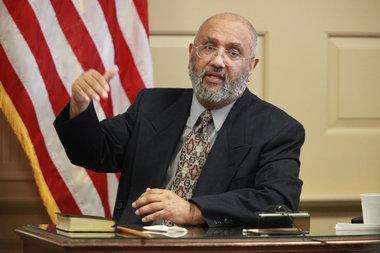By Ben Horowitz
The Star-Ledger
December 20, 2011
http://www.nj.com/news/index.ssf/2011/12/closing_arguments_in_chatham_p.html
 |
| Jose Felicano defendant; testifies in his own trial for the murder of Father Edward Hines of St. Patrick Church in Chatham, during his trial in Morristown. 11/28/11 Photo Jerry McCrea/The Star-Ledger |
CHATHAM BOROUGH — There is no disputing that Jose Feliciano killed the Rev. Edward Hinds by taking a steak knife and stabbing the 61-year-old St. Patrick Church parish priest 44 times. The 66-year-old defendant's attorney conceded that fact.
What a Morris County jury must now decide is whether the former Chatham church custodian is a cold-blooded killer who would stop at nothing to hide his criminal past, or a broken man finally pushed over the edge when he was fired, after enduring years of sexual abuse and blackmail by Hinds.
"We're asking you to find him guilty of what he did, and not guilty of what he didn't do," Feliciano's public defender, Neill Hamilton, told the jury Monday during closing arguments, emphasizing the Oct. 22, 2009 killing had not been planned out.
But accusing Feliciano of fabricating the sex stories, Morris County Prosecutor Robert Bianchi called the defendant "an inveterate liar." Bianchi, who chose to handle the trial himself, added that Feliciano "used sex as a weapon to justify why he did this horrible thing. He didn't want to tell the world, 'I'm just a cold-blooded murderer.' "
Jurors are to begin their deliberations today, following the six-week trial, including eight days of testimony from Feliciano, who was at turns appeared both emotionally detached and overcome.
Should the jury agree to find Feliciano guilty of murder, he faces up to life in prison. But if the panel agrees with Feliciano's passion/provocation manslaughter defense, the Easton, Pa. man could face no more than 10 years behind bars.
In arguing that case, Hamilton cited several "undisputed facts" he said prove Feliciano's courtroom testimony was true, that the defendant killed Hinds when the priest fired him less than five months before his planned retirement. The killing, Feliciano told jurors on the stand, followed four years of Hinds blackmailing him into performing sex acts in exchange for keeping quiet three unresolved 1988 criminal charges involving a minor in Philadelphia.
Hinds "got aroused by sexually humiliating Jose," Hamilton said during his closing. He described Feliciano as "a man who admired" the priest, but "flew into a homicidal rage" after getting fired.
Though all church employees who had contact with children were required to undergo criminal background checks, Feliciano was the only one at St. Patrick's whose fingerprint card hadn't been returned to the State Police in 2009, Hamilton said.
"That was not a coincidence," the attorney added, accusing Hinds of "destroying" the card to "cover up Mr. Feliciano's record."
And when Hinds did fire Feliciano, Hamilton pointed out, he tried to do it "quietly." The priest told no one else he planned to fire Feliciano and he gave the janitor no notice, Hamilton said.
But Bianchi told the jury even if they believe the sexual allegations against Hinds, it still didn't meet the standards for a passion/provocation manslaughter defense. Under the law, "words alone can never constitute an adequate provocation to kill," Bianchi reasoned. "People don't get to slaughter other people because they're upset about what they're saying."
Accusing Feliciano of a "purposeful murder," Bianchi said the janitor "was not there in a homicidal rage. He was negotiating at the end of a knife."
Bianchi said testimony showed Hinds had told a church administrative assistant in April 2009 to make sure the fingerprinting had been done — "the very thing that would expose the 'conspiracy' " Bianchi said.
Then, in August 2009, Hinds was conducting computer searches to see what criminal charges Feliciano may have faced, Bianchi pointed out. If Feliciano had told him of the charges during a religious confession in 2004, as he claimed, "Why would (Hinds) be looking to see what Mr. Feliciano's record was in 2009?" Bianchi asked.
About two weeks before Hinds was killed, a Pennsylvania state trooper mailed the priest a copy of the 1988 warrant listing the three charges against Feliciano. That was the first time Hinds learned of the charges and he soon fired Feliciano, Bianchi said.
Feliciano faces a second murder charge — felony murder — for allegedly taking Hinds' cell phone just after the priest managed to dial 911 for help, and get a few words out to a dispatcher.
Hamilton asked the jury for a not-guilty verdict on that charge, pointing out that Feliciano put the phone down and "didn't intend to take the phone until he started to clean up." Feliciano had meant to hurt Hinds, not steal from him, Hamilton said, noting that about $300 in cash was left in Hinds' pockets.
But Bianchi called the cell phone "a perfect piece of evidence" to prove it was a felony murder. Feliciano "grabbed" the cell phone from the priest to prevent him from completing the 911 call, "depriving him of reaching out for assistance" against his killer, Bianchi said.
Any original material on these pages is copyright © BishopAccountability.org 2004. Reproduce freely with attribution.